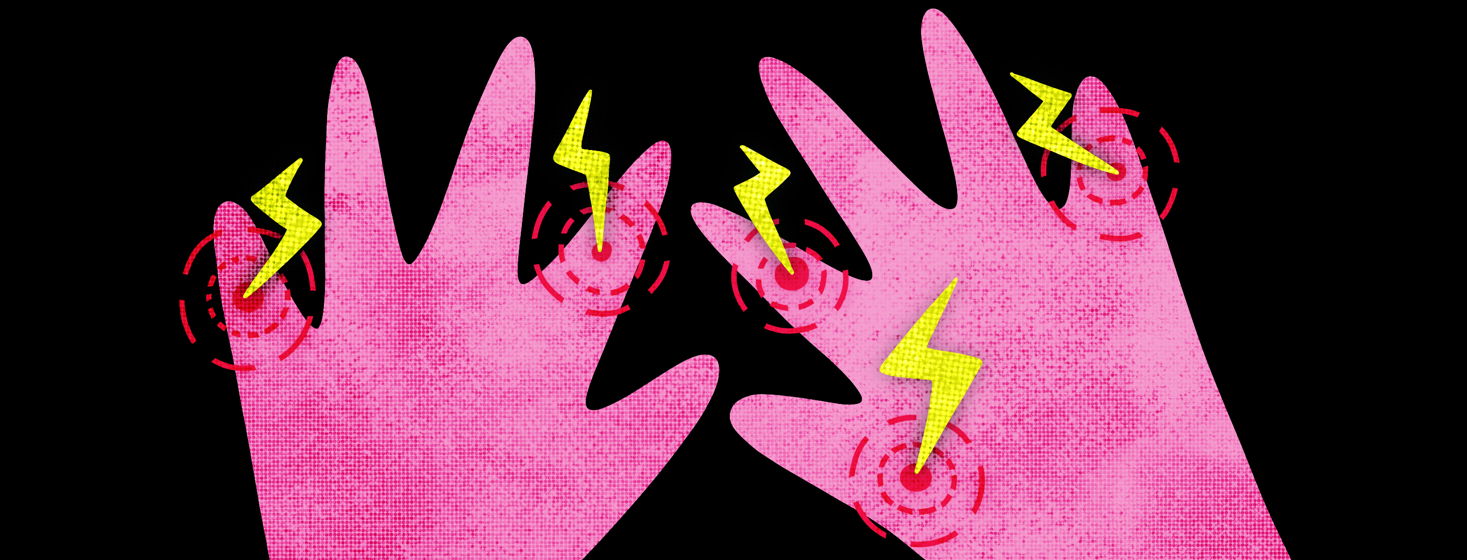Lupus Arthritis And Useless Hands
Quite frankly, I'm fed up with my hands. I’m furious with them. Their pain, swelling, and stiffness have prevented me from doing so many things.
Pain in my finger joints was one of my earliest and harshest lupus symptoms – to the point where I couldn’t even move my pillow when I woke up. The swelling prevented me from wearing my wedding ring for a year.
My hands improved after my diagnosis and treatment but then flared up badly when I was postpartum. It subsided for a while, only bothering me occasionally, but recently it came back with a vengeance. I haven't been able to fulfill all my obligations as a chronically ill mom with useless hands.
I despise all of my lupus symptoms - the malar rash, fatigue, brain fog, and many others. But the pain in my fingers has been interfering with my life the most. Throughout the day, I’ll spend hours on the couch, hands limp, while my fingers pulse with pain. I’m very limited, unable to even use my phone, and I’m frustrated at feeling so helpless.
What my hand pain prevents me from doing
As if lupus didn’t already limit my life enough, these are just some things I can’t do when I have joint pain in my hands:
- Put my son in his car seat - I’ve had to ask many other people for help.
- Grip the steering wheel properly when driving, especially during curves or turns.
- Cut up any fruit or vegetable that isn’t mushy.
- Hold a book.
- Clean anything that requires putting much pressure on your fingers.
- Play guitar – I gave up on that years ago.
- Hold my coffee cup in the morning – I prop it up on a pillow.
- High five people or shake hands without a swift backlash of pain.
You can imagine how long this list would be if I included everything I need to use my hands for daily. Thankfully, there are lots of gadgets that help with kitchen work and even ones for undoing that ever difficult car seat buckle. I’ve gotten creative – using my palms to do lots of things or finding “hacks” like using pliers to open the safety gate. Nonetheless, I’m mortified that I’m constantly asking others to complete tasks for me.
There are also times when I have a momentary memory lapse (thanks lupus) and use my hands to do something I shouldn't, like open a jar. This will make them hurt fiercely even if they weren’t hurting before.
Why isn't lupus arthritis discussed more?
Joint pain is a very common problem among those with lupus, affecting around 90 percent of patients, but I rarely hear it acknowledged as lupus arthritis.1
Lupus arthritis isn’t like rheumatoid arthritis (RA). It generally doesn’t cause deformity or erosion, unless it’s uncontrolled for a long time. My hands hurt relentlessly, they’re tender, and they swell sometimes, but that’s “it.” They don’t get warm, have limited movement, start to go numb, or develop nodules – all common RA manifestations. But I still need adequate treatment for my useless hands.
Right now I treat my hands by soaking them in warm water and resting them, but it’s not nearly enough. I’ve also been offered anti-inflammatories, steroids, and nerve pain medications, which I have used with minimal effect, but so far my rheumatologist doesn’t want to give me steroid injections in my finger joints.
Getting my lupus under better control would be another way to help with my hand pain. Other treatments I can pursue include compression gloves (though I doubt I could wear them for long due to the messy nature of my toddler) or seeing a physical therapist who specializes in hand therapy. I was unable to get a referral from my rheumatologist, so I’m trying to find one on my own.
This is something that lupus patients face all too often: the feeling that your doctor won’t or can’t provide the treatment you need. It puts the burden of finding solutions on our shoulders.
Advocating for lupus arthritis
I have felt a bit left in the dark since I haven’t yet been given more treatment options by my rheumatologist. Nonetheless, I’ll continue to seek solutions for getting my hands to work normally again. Advocating for ourselves is a time-consuming and energy-sucking process, yet it’s the path many of us must take in order to get some control of our lives again.

Join the conversation